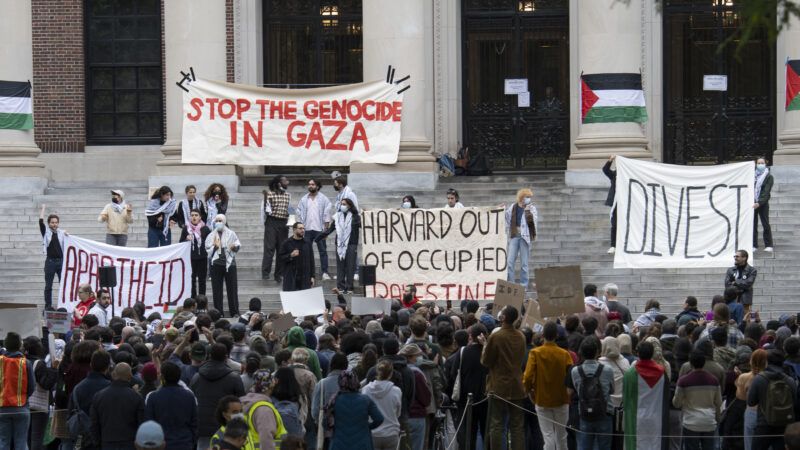Yes, Anti-Israel Protests Are Free Speech
Peaceful pro-Palestine protests are protected by the First Amendment, even if protesters often use offensive or inflammatory rhetoric.

Last Friday, a group of college students penned a guest essay in The New York Times arguing that the wave of anti-Israel, pro-Palestine activity on many college campuses isn't legitimate free expression—and that universities have a "moral responsibility" to combat it.
"Free speech, open debate and heterodox views lie at the core of academic life," wrote Gabriel Diamond, Talia Dror, and Jillian Lederman, students at Yale, Cornell, and Brown respectively. "They are fundamental to educating future leaders to think and act morally. The reality on some college campuses today is the opposite: open intimidation of Jewish students. Mob harassment must not be confused with free speech."
The authors point out several examples of clearly unprotected speech that have unfolded in recent weeks, such as online posts made by a Cornell student who threatened to "shoot up" a kosher dining hall, as well as several instances of physical violence against Jewish students.
However, many of the other examples the authors single out are blatantly First Amendment–protected expression.
"Masked students have chanted slogans such as 'From the river to the sea, Palestine will be free,' which many view as a call for the destruction of Israel. Others have shouted, 'There is only one solution, intifada revolution,'" they write. Additionally, Diamond, Dror, and Lederman noted several examples of professors who made offensive statements about the terrorist attack, lamenting that "to the best of our knowledge, none of these professors have received meaningful discipline, much less dismissal."
Despite their claimed commitments, the authors make a plain-faced call for censorship by invoking university speech codes.
"The codes of ethics of universities across the country condemn intimidation and hold students and faculty to standards of dignity and respect for others. Campuses are at a crossroads: The leadership can either enforce these ethics or these places of learning will succumb to mob rule by their most radical voices," they write. "Simply affirming that taunts and intimidation have no place on campus isn't enough. Professors violating these rules should be disciplined or dismissed. Student groups that incite or justify violence should not be given university funds to conduct activity on campus."
While universities should step in and punish students who actually break the law, like those who mount violent threats or engage in a heckler's veto to prevent other students from speaking—not to mention those who engage in actual physical violence, the authors are advocating for sweeping censorship of offensive anti-Isreal speech while implying it isn't really "free" speech at all.
"Speech is protected unless it falls into one of the narrow categories of unprotected speech," Zach Greenberg, an attorney at the Foundation for Individual Rights and Expression, a First Amendment nonprofit, tells Reason. Greenberg adds that a protest chant like "'From the river to the sea' would be a political slogan. It's not specific, It's not targeted. It's not directly threatening any individual people [with violence]. So it would be protected by free speech."
"To be able to think freely, you have to be able to offend others. To discover our own views and to challenge the status quo. And it's hard to do that without offending others or maybe potentially offending others," says Greenberg. "Students shouldn't have to risk their educational careers walking on eggshells by censoring themselves at universities that are seeking to punish offensive speech."
Even though pro-Palestine activism on college campuses has frequently involved inflammatory rhetoric—and even open celebration of Hamas' terrorism—this speech is clearly protected by the First Amendment. While moral outrage against this speech is more than justified, calls for universities to stifle it are contrary to the values of "free speech, open debate and heterodox views" the authors say they hold dear.


Show Comments (259)